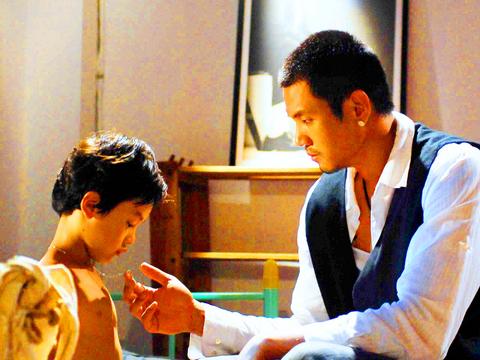There is nothing intrinsically vicious about a tearjerker movie, and going to the movies for a good cry has a long and distinguished tradition. I Wish (奇妙的旅程), the new celebrity vehicle featuring TV host Blackie (陳建州) and model Cheryl Yang (楊謹華) sets out to move its audience to tears, but unfortunately, instead of tugging at the heart strings, it launches into an assault on the tear ducts that flagrantly disregards all sense of good taste and common decency. It's an act of emotional battery that has all the subtlety of a blow to the head from a blunt instrument.
The plot is not without potential. Blackie (陳建州) plays Lee Bing, a gifted music student who has become a bitter and emotionally stunted grown-up who scraps a living singing in pubs. One day, he finds a child at his door who claims to be his son by his estranged wife Qi Li (Cheryl Yang, 楊謹華). The kid leads him on a journey of self-discovery that involves a deathbed wish (hence the title) and a little girl struggling with terminal leukemia. Without giving away the plot twist that wrings a few more tears from the audience, there are shades of Ghosts, Sixth Sense and the host of movies about innocent childhood redeeming the misdirected lives of grown-ups.
Blackie's narrow range of emotional expression (mostly he simply looks constipated) in a film that tries to show the nuances of suffering is the first strike against I Wish. Wang Cheng-wei (汪政緯), who has also come of age through TV variety shows, is cute as the child of the story, but heavy-handed cuteness wears down audiences' patience. Strike two. A deathbed scene with Yang leaning forward while wearing a low-cut V-neck was just the most heinous instance of director Hsu Guo-jhih's (徐國誌) lack of taste. Strike three. An intrusive musical score that felt the need to underline every emotional moment. Strike four. A Sunday-school theme of the wish-fulfilling properties of a Christian god was seriously annoying, and made the film, packed with a young generation of TV personalities, strangely dated and preachy. Strike five ... wait. You only get three strikes.

PHOTO: COURTESY OF JETTONE FILMS LIMITED
I Wish is a commendable effort of Taiwan's film industry to break out of the art house and establish a relationship with the mainstream movie-going public. Leveraging the appeal of well-known TV personalities, and linking with variety show Blackie's Teenage Club (我愛黑澀會) and the talent show One Million Star (超級星光大道), is a device of proven worth, distasteful as it may be. It is unfortunate that ham-fisted direction and workaday acting undermines any serious cinematic pretensions and the whole thing comes off rather like an extended public service advertisement for loving thy neighbor.

The Taipei Times last week reported that the rising share of seniors in the population is reshaping the nation’s housing markets. According to data from the Ministry of the Interior, about 850,000 residences were occupied by elderly people in the first quarter, including 655,000 that housed only one resident. H&B Realty chief researcher Jessica Hsu (徐佳馨), quoted in the article, said that there is rising demand for elderly-friendly housing, including units with elevators, barrier-free layouts and proximity to healthcare services. Hsu and others cited in the article highlighted the changing family residential dynamics, as children no longer live with parents,

It is jarring how differently Taiwan’s politics is portrayed in the international press compared to the local Chinese-language press. Viewed from abroad, Taiwan is seen as a geopolitical hotspot, or “The Most Dangerous Place on Earth,” as the Economist once blazoned across their cover. Meanwhile, tasked with facing down those existential threats, Taiwan’s leaders are dying their hair pink. These include former president Tsai Ing-wen (蔡英文), Vice President Hsiao Bi-khim (蕭美琴) and Kaohsiung Mayor Chen Chi-mai (陳其邁), among others. They are demonstrating what big fans they are of South Korean K-pop sensations Blackpink ahead of their concerts this weekend in Kaohsiung.

Oct 20 to Oct 26 After a day of fighting, the Japanese Army’s Second Division was resting when a curious delegation of two Scotsmen and 19 Taiwanese approached their camp. It was Oct. 20, 1895, and the troops had reached Taiye Village (太爺庄) in today’s Hunei District (湖內), Kaohsiung, just 10km away from their final target of Tainan. Led by Presbyterian missionaries Thomas Barclay and Duncan Ferguson, the group informed the Japanese that resistance leader Liu Yung-fu (劉永福) had fled to China the previous night, leaving his Black Flag Army fighters behind and the city in chaos. On behalf of the

I was 10 when I read an article in the local paper about the Air Guitar World Championships, which take place every year in my home town of Oulu, Finland. My parents had helped out at the very first contest back in 1996 — my mum gave out fliers, my dad sorted the music. Since then, national championships have been held all across the world, with the winners assembling in Oulu every summer. At the time, I asked my parents if I could compete. At first they were hesitant; the event was in a bar, and there would be a lot